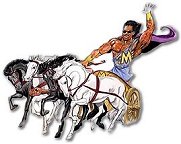
PAGE TWO OF THE FAMOUS RACE
BETWEEN ATALANTA & HIPPOMENES
by Padraic Colum (1881–1972) from his 1921 book
The Golden Fleece and the Heroes Who Lived before Achilles
PLEASE READ PAGE ONE FIRST,
IF YOU HAVEN'T ALREADY!
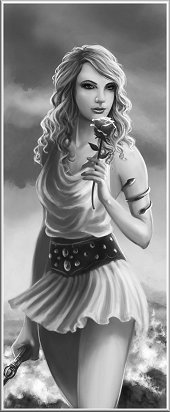
APHRODITE BY ALYANA
| She was as woman of wonderful presence. As Hippomenes looked upon her he knew that she was Aphrodite, the goddess of beauty and of love. |
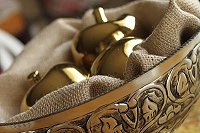 CLICK TO ENLARGE |
| When he showed himself beside Atalanta all around the course were silent, for they all admired Hippomenes for his beauty and for the spirit that was in his face. |
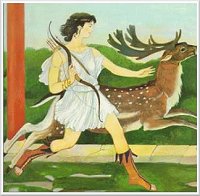 CLICK TO ENLARGE |
| Then it seemed to him that she checked her swiftness a little to look back at him. |
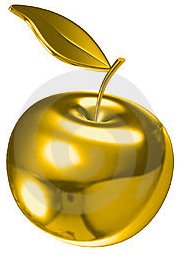 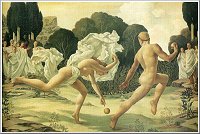 CLICK TO ENLARGE 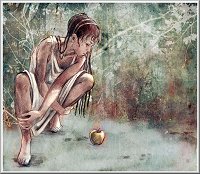 CLICK TO ENLARGE |
(Continued from Page One)
Even as he looked across the sandy course now deserted by the throng, he saw one
move across it, coming toward him with feet that did not seem to touch the
ground.
She was a woman of wonderful presence. As Hippomenes looked upon her he knew
that she was Aphrodite, the goddess of beauty and of love.
“Hippomenes,” said the immortal goddess, “the gods are mindful of you who are
sprung from one of the gods, and I am mindful of you because of your own worth.
I have come to help you in your race with Atalanta, for I would not have you
slain, nor would I have that maiden go unwed. Give your greatest strength and
your greatest swiftness to the race, and behold! here are wonders that will
prevent the fleet-footed Atalanta from putting all her spirit into the race.”
And then the immortal goddess held out to Hippomenes a branch that had upon it
three apples of shining gold. “In Cyprus,” said the goddess, “where I have come
from, there is a tree on which these golden apples grow. Only I may pluck them.
I have brought them to you, Hippomenes. Keep them in your girdle, and in the
race you will find out what to do with them, I think.”
So Aphrodite said, and then she vanished, leaving a fragrance in the air and the
three shining apples in the hands of Hippomenes.
Long he looked upon their brightness. They were beside him that night, and when
he arose in the dawn he put them in his girdle. Then, before the throng, he went
to the place of the race.
When he showed himself beside Atalanta all around the course were silent, for
they all admired Hippomenes for his beauty and for the spirit that was in his
face; they were silent out of compassion, for they knew the doom that befell the
youths who raced with Atalanta.
And now Schœneus, the black-bearded king, stood up, and he spoke to the throng,
saying, “Hear me all, both young and old: this youth, Hippomenes, seeks to win
the race from my daughter, winning her for his bride. Now, if he be victorious
and escape death I will give him my dear child, Atalanta, and many fleet horses
besides as gifts from me, and in honor he shall go back to his native land. But
if he fail in the race, then he will have to share the doom that has been meted
out to the other youths who raced with Atalanta hoping to win her for a bride.”
Then Hippomenes and Atalanta crouched for the start. The trumpets were sounded
and they darted off.
Side by side with Atalanta Hippomenes went.
Her flying hair touched his breast,
and it seemed to him that they were skimming the sandy course as if they were
swallows.
But then Atalanta began to draw away from him. He saw her ahead of him, and then
he began to hear the words of cheer that came from the throng—“Bend to the race,
Hippomenes! Go on, go on! Use your strength to the utmost.”
He bent himself to the race, but further and further from him Atalanta drew.
Then it seemed to him that she checked her swiftness a little to look back at
him.
He gained on her a little. And then his hand touched the apples that were in his
girdle. As it touched them it came into his mind what to do with the apples.
He was not far from her now, but already her swiftness was drawing her further
and further away. He took one of the apples into his hand and tossed it into the
air so that it fell on the track before her.
Atalanta saw the shining apple. She checked her speed and stooped in the race to
pick it up. And as she stooped Hippomenes darted past her, and went flying
toward the goal that now was within his sight.
But soon she was beside him again. He looked, and he saw that the goal marks
were far, far ahead of him. Atalanta with the flying hair passed him, and drew
away and away from him.
He had not speed to gain upon her now, he thought, so he put his strength into
his hand and he flung the second of the shining apples.
The apple rolled before her and rolled off the course. Atalanta turned off the
course, stooped and picked up the apple.
Then did Hippomenes draw all his spirit into his breast as he raced on. He was
now nearer to the goal than she was. But he knew that she was behind him, going
lightly where he went heavily. And then she was beside him, and then she went
past him.
She paused in her speed for a moment and she looked back on him. As he raced on,
his chest seemed weighted down and his throat was crackling dry. The goal marks
were far away still, but Atalanta was nearing them.
He took the last of the golden apples into his hand. Perhaps she was now so far
that the strength of his throw would not be great enough to bring the apple
before her. But with all the strength he could put into his hand he flung the
apple.
It struck the course before her feet and then went bounding wide. Atalanta
swerved in her race and followed where the apple went.
Hippomenes marveled that he had been able to fling it so far. He saw Atalanta
stoop to pick up the apple, and he bounded on.
And then, although his strength was failing, he saw the goal marks near him. He
set his feet between them and then fell down on the ground.
The attendants raised him up and put the victor’s wreath upon his head. The
concourse of people shouted with joy to see him victor.
But he looked around for Atalanta and he saw her standing there with the golden
apples in her hands.
“He has won,” he heard her say, “and I have not to hate myself for bringing a
doom upon him. Gladly, gladly do I give up the race, and glad am I that it is
this youth who has won the victory from me.”
She took his hand and brought him before the king. Then Schœneus, in the sight
of all the rejoicing people, gave Atalanta to Hippomenes for his bride, and he
bestowed upon him also a great gift of horses.
With his dear and hard-won bride, Hippomenes went to his own country, and the
apples that she brought with her, the golden apples of Aphrodite, were
reverenced by the people.
from his 1921 book
The Golden Fleece and the
Heroes Who Lived before Achilles
HERE IS THE MAIN ATALANTA PAGE!
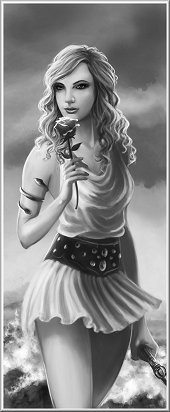
APHRODITE BY ALYANA
| And then the immortal goddess held out to Hippomenes a branch that had upon it three apples of shining gold. |
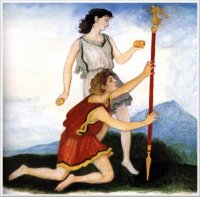 CLICK TO ENLARGE |
| Then Hippomenes and Atalanta crouched for the start. The trumpets were sounded and they darted off. |
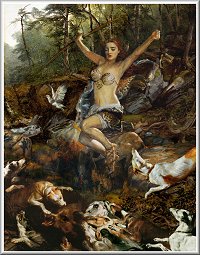 CLICK TO ENLARGE |
| He took one of the apples into his hand and tossed it into the air so that it fell on the track before her. |
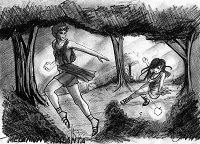 CLICK TO ENLARGE |
| He was now nearer to the goal than she was. But he knew that she was behind him, going lightly where he went heavily. And then she was beside him, and then she went past him... |
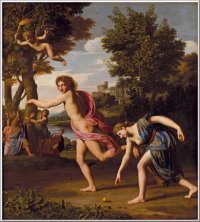 CLICK TO ENLARGE 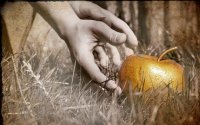 CLICK TO ENLARGE |
[HOME]
[MYTHOLOGY'S
EFFECTS ON MODERN SOCIETY] [OLYMPIANS]
Web, myth narration and graphics created and maintained by Nick Pontikis
Copyright © 1995 Nick Pontikis
Thanasi's Olympus Greek
Restaurant
Copyright 1999 mythman.com
greekmythologytoday.com
mythmaniacs.com
The Myth Man persona copyright 1988 Nick Pontikis
